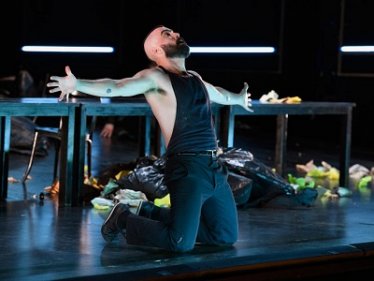Don Giovanni - Schedule, Program & Tickets
Don Giovanni
Date:
Time:
Price class:
Location:
26.06.2024 , Wednesday
19:00
B
Deutsche Oper, Bismarckstraße 35, 10627 Berlin, Germany
Dramma giocoso in two acts
Libretto by Lorenzo da Ponte
First performance on October 29, 1787 in Prague
Premiered at the Deutsche Oper Berlin on October 16, 2010
recommended from 16 years
approx. 3 hours 30 minutes / one break
In Italian with German and English surtitles
Introduction: 45 minutes before the start of the performance in the foyer on the right
"Where did you get the insane rights you've dedicated your life to?" George Sand asks the Legendary. He casually confides to Gottfried Benn: “I once dreamed that a young birch gave me a son.” No other fictional character of modern times has received more public attention than Don Juan, the “seducer of Seville”, who was penned by a Spanish monk in 1613 escaped. Only seven years younger than his compatriot Don Quijote, he has since made his way through dramas, epics, novels and operas, haunting cinema screens and plasma screens. Against changing moral backgrounds he boasts - memorial and icon - with his famous list, designed against death, which he casts as a stony shadow. "Mine shall be Hell!" Lord Byron heard him say.
A cutting chord opens the overture to a dramma giocoso on the death course of DON GIOVANNI on October 29, 1787 in the Counts Nostiz National Theater in Prague, conducted by the composer. In the history of music theater, this moment can be compared retrospectively with the Big Bang. In order to be able to put himself in the role of the rampant libertine and blasphemer, the lyricist Lorenzo da Ponte had to keep in the mood by flirting with his landlady's daughter. Mozart himself, who had been successful the year before with his FIGARO, composed for 1,000 guilders under great time pressure. The overture will not be finished until 7 p.m. on the day of the premiere. Søren Kierkegaard sees a “lightning flash” that “breaks away from the darkness of the storm cloud, more erratic than this and yet just as rhythmic. Hear the unbridled desire of passion, hear the roar of love, hear the murmur of temptation, hear the whirl of seduction, hear the silence of the moment – hear, hear, hear Mozart’s Don Juan!”
The descent into hell, to which the archetype of moral reprehensibility was previously condemned, this time arrives as a soul. The whole of Western metaphysics is used for its end, but it no longer only confirms the indignation of the just, but causes dismay. The freedom that the libertine praises against prescribed humility makes him an anarchic prototype on the threshold of the French Revolution. In its self-indulgence, as a life plan peeled from the dictates of hormones, the impulsive longings and self-realization fantasies of subsequent generations can be reflected.
In the 19th century he was related by marriage to Faust, only to then leave him to psychoanalysis, burdened with meaning. Julia Kristeva locates in him the "son of a mother who becomes a dreamer with her husband and passes on to her little ones that he may conquer all women in a way that no one has ever conquered them". Albert Camus thinks it is unlikely that he could be sad. How the "laughter, the victorious impertinence, the erratic nature", the deeply earthly quality that the French philosopher diagnoses in him can be deceptive! – With D.H. Lawrence the Restless muses, "Where is my peace? The mystery must be in love with me..."
What drives the seducer through the bedrooms of the centuries? What hunts the hunter? Who is this man who always just means, really?
Subject to change.
Libretto by Lorenzo da Ponte
First performance on October 29, 1787 in Prague
Premiered at the Deutsche Oper Berlin on October 16, 2010
recommended from 16 years
approx. 3 hours 30 minutes / one break
In Italian with German and English surtitles
Introduction: 45 minutes before the start of the performance in the foyer on the right
"Where did you get the insane rights you've dedicated your life to?" George Sand asks the Legendary. He casually confides to Gottfried Benn: “I once dreamed that a young birch gave me a son.” No other fictional character of modern times has received more public attention than Don Juan, the “seducer of Seville”, who was penned by a Spanish monk in 1613 escaped. Only seven years younger than his compatriot Don Quijote, he has since made his way through dramas, epics, novels and operas, haunting cinema screens and plasma screens. Against changing moral backgrounds he boasts - memorial and icon - with his famous list, designed against death, which he casts as a stony shadow. "Mine shall be Hell!" Lord Byron heard him say.
A cutting chord opens the overture to a dramma giocoso on the death course of DON GIOVANNI on October 29, 1787 in the Counts Nostiz National Theater in Prague, conducted by the composer. In the history of music theater, this moment can be compared retrospectively with the Big Bang. In order to be able to put himself in the role of the rampant libertine and blasphemer, the lyricist Lorenzo da Ponte had to keep in the mood by flirting with his landlady's daughter. Mozart himself, who had been successful the year before with his FIGARO, composed for 1,000 guilders under great time pressure. The overture will not be finished until 7 p.m. on the day of the premiere. Søren Kierkegaard sees a “lightning flash” that “breaks away from the darkness of the storm cloud, more erratic than this and yet just as rhythmic. Hear the unbridled desire of passion, hear the roar of love, hear the murmur of temptation, hear the whirl of seduction, hear the silence of the moment – hear, hear, hear Mozart’s Don Juan!”
The descent into hell, to which the archetype of moral reprehensibility was previously condemned, this time arrives as a soul. The whole of Western metaphysics is used for its end, but it no longer only confirms the indignation of the just, but causes dismay. The freedom that the libertine praises against prescribed humility makes him an anarchic prototype on the threshold of the French Revolution. In its self-indulgence, as a life plan peeled from the dictates of hormones, the impulsive longings and self-realization fantasies of subsequent generations can be reflected.
In the 19th century he was related by marriage to Faust, only to then leave him to psychoanalysis, burdened with meaning. Julia Kristeva locates in him the "son of a mother who becomes a dreamer with her husband and passes on to her little ones that he may conquer all women in a way that no one has ever conquered them". Albert Camus thinks it is unlikely that he could be sad. How the "laughter, the victorious impertinence, the erratic nature", the deeply earthly quality that the French philosopher diagnoses in him can be deceptive! – With D.H. Lawrence the Restless muses, "Where is my peace? The mystery must be in love with me..."
What drives the seducer through the bedrooms of the centuries? What hunts the hunter? Who is this man who always just means, really?
Subject to change.







